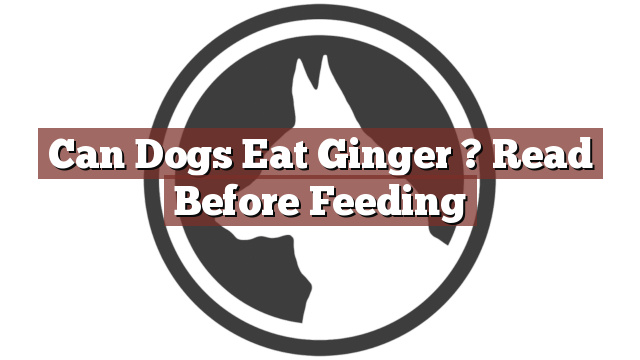Understanding Your Dog’s Dietary Needs
As a responsible pet owner, it is essential to understand your dog’s dietary needs. Dogs have different nutritional requirements compared to humans, and it is crucial to provide them with a balanced diet that meets their specific needs. While dogs primarily thrive on a diet consisting of meat and vegetables, it is important to be cautious about the specific foods you introduce into their diet. Some human foods can be harmful or toxic to dogs, so it is vital to research before feeding them anything new.
Can Dogs Eat Ginger? Read Before Feeding
Can dogs eat ginger? This is a common question among dog owners who want to share their favorite foods or spices with their furry friends. The good news is that yes, dogs can eat ginger in moderation. Ginger is a natural root that is often used for its medicinal properties. It is known for its anti-inflammatory and digestive benefits and can be a valuable addition to a dog’s diet under certain circumstances.
The Pros and Cons of Feeding Ginger to Dogs
Feeding ginger to dogs can have several benefits. The anti-inflammatory properties of ginger can help alleviate joint pain and stiffness, making it particularly beneficial for older dogs or those with arthritis. Ginger can also aid in digestion and reduce nausea, making it a useful remedy for dogs experiencing stomach upset or motion sickness. Additionally, ginger can help boost the immune system and improve blood circulation, promoting overall health in dogs.
However, it is important to note that ginger should be given to dogs in moderation. While small amounts of ginger are generally safe, excessive consumption can lead to gastrointestinal upset, including diarrhea and stomach irritation. It is always recommended to consult with your veterinarian before introducing any new food into your dog’s diet, including ginger. Your vet can provide guidance on the appropriate amount and frequency of ginger intake based on your dog’s specific health needs.
Conclusion: Considerations for Feeding Ginger to Your Dog
In conclusion, while dogs can eat ginger, it should be done in moderation and with caution. Ginger can provide several health benefits for dogs, including anti-inflammatory and digestive benefits. However, it is important to consult with your veterinarian before adding ginger to your dog’s diet, especially if your dog has any pre-existing health conditions or is taking medication. Remember that every dog is different, and what may be safe for one dog may not be suitable for another. By understanding your dog’s dietary needs and seeking professional advice, you can make informed decisions about their diet and ensure their overall well-being.
Thank you for taking the time to read through our exploration of [page_title]. As every dog lover knows, our furry friends have unique dietary needs and responses, often varying from one canine to another. This is why it's paramount to approach any changes in their diet with caution and knowledge.
Before introducing any new treats or making alterations to your dog's diet based on our insights, it's crucial to consult with a veterinarian about [page_title]. Their expertise ensures that the choices you make are well-suited to your particular pet's health and well-being.
Even seemingly harmless foods can sometimes lead to allergic reactions or digestive issues, which is why monitoring your dog after introducing any new food item is essential.
The content provided here on [page_title] is crafted with care, thorough research, and a genuine love for dogs. Nevertheless, it serves as a general guideline and should not be considered a substitute for professional veterinary advice.
Always prioritize the expert insights of your veterinarian, and remember that the health and happiness of your furry companion come first.
May your journey with your pet continue to be filled with joy, love, and safe culinary adventures. Happy reading, and even happier snacking for your canine friend!

